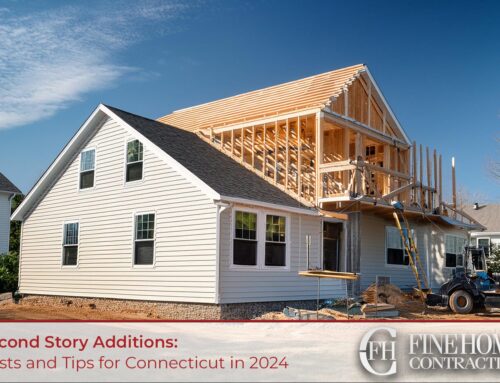Hiring a contractor for home renovations or repairs can be a stressful experience. Most contractors are honest professionals, but some unscrupulous ones prey on unsuspecting homeowners, relying on the assumption that they are unaware of licensing and insurance standards, unfamiliar with the remodeling process, and unlikely to get a second opinion. Being able to recognize the signs of a shady contractor can help you avoid becoming a victim. Here are 10 types of scam contractors to watch out for, and some tips on thoroughly vetting your contractor.
At Fine Home Contracting, we would of course love for you to choose us as your contractor, but whether you go through us or the competition, we want you to have the resources at your disposal to find the best fit for your project, avoid potential scams, and feel secure in your choice.
Most Common Contractor Red Flags
1
1
The Disappearing Act
This scam starts out promisingly enough. The contractor provides a reasonable quote, agrees to do the job, and may even start work. However, at some point the contractor takes your deposit and vanishes without completing any of the agreed upon work. He or she ignores all attempts to contact them, leaving the project half-finished.
2
2
Bait and Switch Pricing
Some contractors will initially provide a very low estimate to undercut their competitors and win the job. However, once work begins they start piling on additional fees for unexpected issues. These extras can really add up, resulting in a final bill that is two or three times the original quote. Legitimate cost overruns do happen, but excessive, vague fees are a red flag.
3
3
Shoddy Workmanship
Shady contractors often cut corners in their work. This allows them to get jobs done quicker and move on to the next victim. They may use inferior quality or insufficient materials, ignore building codes, or take other shortcuts. The result is a finished product that looks good superficially but falls apart upon closer inspection.
4
4
Demands Full Payment Upfront
Most contractors require a percentage downpayment to purchase materials, with the balance due upon satisfactory completion. Scam contractors often insist on full payment before work begins. They claim they can offer a discount for payment in full upfront, which is very tempting. In reality, once they get paid there is little incentive to do a good job or even finish.
5
5
Doesn’t Pull Required Permits
Reputable contractors will obtain all required permits for the project and call for inspections at appropriate stages. Shady contractors skip this process to save time and money. This puts homeowners at risk of fines, delays during sale of the home, or serious issues down the road if work was substandard.
6
6
Uses High Pressure Sales Tactics
Scam contractors are eager to pressure people into signing contracts before they have time to thoroughly evaluate the deal. They may offer special one day only pricing or claim the deal is only available to the first few customers. This prevents homeowners from shopping around, comparing bids, checking references, and making an informed decision.
7
7
Lacks Proper Licensing and Insurance
Most states require contractors to hold a valid license, and carry both general liability and workers compensation insurance. Ask to see the contractor’s license, and verify it is current. Also get certificates proving proper insurance, and confirm they are not expired. Lack of proper credentials is a huge red flag.
8
8
Has Lots of Complaints Against Them
Do some digging to check for customer complaints. Search online review sites and sites like BBB.org, Houzz, and Angie’s List. Check with your state Attorney General’s office to see if complaints have been filed. Look for consistent themes in the complaints that indicate shoddy work or dishonest practices.
9
9
Refuses to Sign a Detailed Contract
Detailed contracts protect both homeowners and contractors. Scam contractors often resist signing one. Without a contract, it’s just your word against theirs when disputes arise. A contract should include full project details, timeline, payment schedule, warranty terms, and more. Refusal to sign is a sign of trouble ahead.
10
10
Their Price is Too Good To Be True
If you receive multiple quotes at different prices, and one contractor’s proposal is significantly cheaper, it may be a red flag. While costs vary between quoting companies, a concerningly low quote implies that the contractor is underspending somewhere else in your budget compared to the competition. Whether that money comes out of material costs, labor, or management, a concerningly low price is a sign that corners are being cut.
How to Protect Yourself from Scam Contractors
While we like to think most contractors are upstanding professionals, it pays to be cautious when handing over your hard-earned money for home projects. Here are some tips to avoid becoming victimized by unscrupulous contractors:
1
1
Check References and Reviews
Always get references from previous customers, and take time to call them. Also research online reviews carefully. While no contractor will have perfect reviews, look for any consistent complaints or themes that suggest issues down the road.
Useful resources to vet contractors include:
2
2
Get Multiple Bids
Don’t just go with the first bid. Interview 3-4 contractors and get quotes. This allows you to ask lots of questions and compare bids fairly to choose the best fit for the job and budget. View each meeting as a job interview, where you are assessing not only the promises the company makes, but their customer service throughout the quoting process. If your contractor’s customer-facing sales team is unfriendly, it’s safe to say that you might not have a great experience with their workmen.
3
3
Require a Detailed Written Contract
The contract should specify exact project scope, materials, timeline, warranty, payment schedule, and more. Make sure permit fees are included, never pay 100% upfront, and tie payments to progress milestones. A detailed contract should set expectations about how unforeseen changes are handled. Ask your contractor about Additional Work Orders and Change Orders, and how equipped they are to handle any sudden changes to the plan.
4
4
Pay in Installments
Avoid paying large sums upfront. Most projects require 10-35% down with progress payments tied to completion of milestones. Withhold 15-20% of total price until the end to ensure satisfaction.
5
5
Verify Licensing and Insurance
Check credentials are valid and current before signing a contract. Unlicensed, uninsured contractors put you at great financial risk if things go wrong. Being insured unfortunately doesn’t always mean that your contractor is fully covered, so it is important to ask about Workmans Compensation coverage and other contingent insurance.
To check a contractor’s license is valid in Connecticut, use the following tool provided by the State:
Finding a trustworthy, skilled contractor takes research and due diligence. Avoid being pressured into quick decisions or handing over too much money upfront. Thoroughly check out potential contractors, get multiple bids, and take time to verify references, reviews, licensing, and insurance. Secure all agreements in a detailed written contract. Pay in installments as work is completed satisfactorily. Following these tips will help you find the best contractor for the job and avoid falling victim to scam artists.







